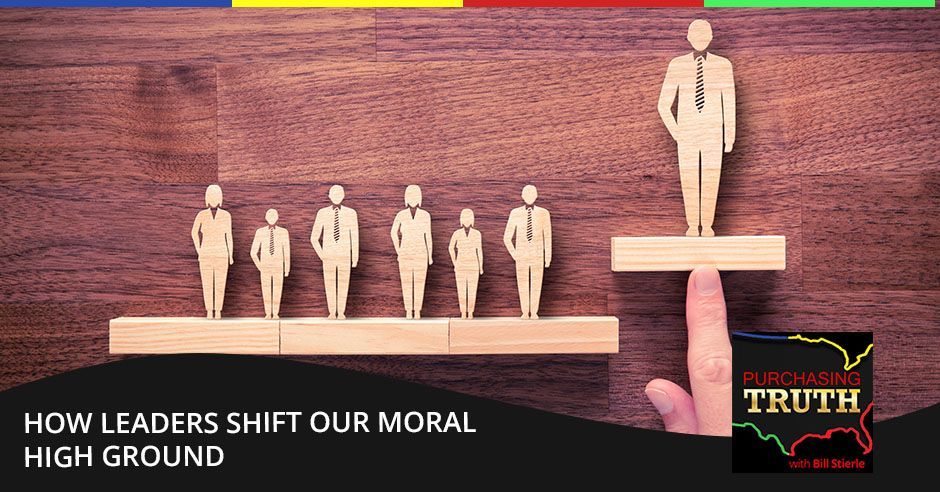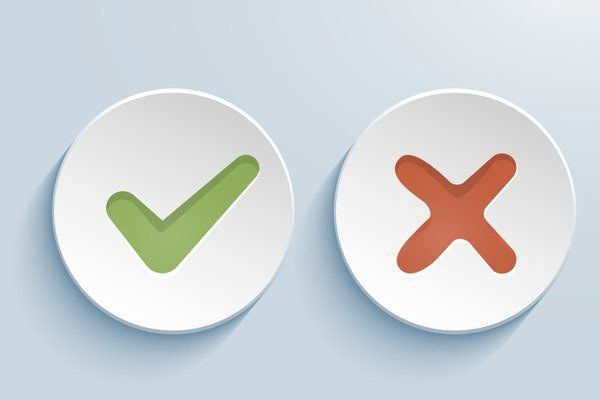How Leaders Shift Our Moral High Ground
Subscribe Today!

Society’s overall moral high ground is like a goalpost that constantly moves from one place to another throughout the years. Without it firmly rooted to the ground, many situations we typically consider wrong or unacceptable in the past may become tolerable today. Bill Stierle and Tom dive deep into the many possibilities of how such an ever-changing and evolving nature of our moral compass can shape – and divide – society and the nation, especially with political leaders contributing a lot to these shifts. They further emphasize the problem with this constant shift by presenting the vast differences in how people received and approached different public issues. Among the cases they present are the sexual allegations against Andrew Cuomo and Harvey Weinstein, Brian William’s fabricated helicopter crash, and the many flaws with President Trump’s COVID-19 response.
---
Watch the episode here
Bill, there are so many things going on in the world that make us question, “Where the moral high ground is, who has it, and is it even there.” I’m getting confused by so many things that are different messages, situations and conflict with each other in this regard.
That’s a challenge. You and I were talking about taking a look at the challenges our society has with who has the moral high ground and what messages regarding morality stick out or the ones that we’re going to fight for and the ones we’re going to say, “No. We’re going to give a pass to somebody that is in prominence because they’re on our team. We like the person. We’re going to be sensitive. Now that somebody has been affected that is close to us, we’re going to be concerned with it.” The biggest example I can think of is a switch of the moral high ground would be during the AIDS epidemic, when the Ronald Reagan administration was doing nothing or very little towards the AIDS epidemic.
“It’s affecting gays. It’s this gay thing.” The pivot comes when Rock Hudson, the president’s friend got AIDS and died from it. It’s like, “We better do something because one of my friends got affected by this. It’s a disease. It used to be this other thing to this other group that we weren’t interested in doing but the morality changed because it hit close to us.” It’s similar to what Governor Andrew Cuomo’s is going through with the nursing homes. You were controlling optics instead of doing the moral high ground. That thing is junky. You’ve got to do something about this situation. It’s problematic and challenging to deal with the ethics and the morals that we would like to live by. Here’s the funny part but also the upsetting part about it is who’s setting those standards for what is moral and what is not.
That is scary, Bill, to think about who is the arbiter of what is morally acceptable and what is not. That is a goalpost that seems to be continuing to move. That’s why it’s so frustrating to me as an observer. There are so many ways in which that goalpost has moved.
I appreciate that, Tom, the discussion of how the goalpost has moved. That gets back to a term that we used in the past around situational ethics. I’m ethical in this situation but there’s other situation. The extreme is, “Are we going to burn them at the stake? It’s going to help us with our party to burn them at the stake. Out with them, done.” It’s challenging. People are going to try to fight back with that. Cancel culture has got obliterated as a concept because all of a sudden, you’re going to go to it as if it’s a card to play against something ethical and moral. This is above a level seven issue. Sending people back to the nursing homes or infected people back to the nursing homes and then under counting the passing of it are not moral to do. Is that okay if you and I can sit in moral judgment, if that’s all right, Tom? We can do that.
Yes. We need to at least discuss it.
The reason why I asked it that way is because everyone is in charge of their own moral compass. Click to Tweet
As a nation, are we going to stand for the moral high ground or are we going to let the financial relationship or the political relationship we have with Saudi Arabia be like it is and not come out with a strong narrative of, “You killed somebody that was an American or somebody that was a resonant over here working for a company and you did that?” That death is morally reprehensive ball but the way they delivered it was not at a 7, 8 or 9. They delivered it at a 5, maybe a 6.
Everybody's in charge of their own moral compass. That was a politically tricky situation from a different administration that was in power at the time. It would have been dealt with a little differently but saying, “They’re buying all these arms from us. That’s good for American business. We have to put our righteous indignation on the back burner here or we’re going to upset this other aspect of the relationship.” Those are the tricky things that happen.
Tom, the hard question here is about communication. “Does money influence morals?”
It does, unfortunately, money and power. Power is a currency that influences morals. It’s interesting because we can look at things that have taken place over the last years, see how the proportionality of things has changed and what may have been something that was morally unacceptable years ago has become so commonplace now. It makes the action that was taken years ago look draconian.
We hold politicians to the concept of a squeaky clean politician and a squeaky clean celebrity. Are they following in that moral place that we say yes? The challenge is that somebody has to do it, to start a rumor about any celebrity and then all of a sudden they get to wait to chisel away from that’s the shine on that celebrity. You get to chisel away at that person’s thing that they built up in their career. I’ve built up people admiring me for courage. People admiring me for getting out there and telling that risky joke but all of a sudden the risky joke has a downside to it and that one’s hard.
Let’s go through a bit of a timeline of events and things to talk about all the different morality issues, how people are being held accountable now and how they were held accountable years ago. Let’s start with Governor Andrew Cuomo of New York. We have the nursing home scandal. That is troubling. That’s a different issue that is being investigated. The other big thing he’s facing on the moral scale of things is sexual harassment that he made. He’s being accused of making advances to women, even unwanted touching or a kiss. Those in the post me to the world that we live in is something that is being raised to on alarm level 8 or 9 on a scale of 10 where he’s being investigated. A ton of people in the democratic political power circle are calling for him to resign.
Nothing’s been proven. There are 5 or 6 allegations of varying things to where he said he spoke something that made someone uncomfortable too, as far as well, pose for a photo and he put his hand on my back, perhaps under someone’s shirt or held there for too long and maybe kissed someone. That’s the extent of it when you think of what’s come to light so far. I’m not defending him. This is not my point here. When you compare him to Harvey Weinstein who there are hundreds of women that he is alleged to have raped and there’s enough evidence accumulated that he’s been arrested and put in jail pending trial. There’s a proportionality thing here that is hard to ignore.
For women reading this about their experience as women being pursue, common and upon and to deal with the famous video of the woman walking through New York City and being catcalled all the way through the streets. The volume of which that narrative moves in the direction regarding body imagery, sexuality, connection time and the proportionality of this, the situational ethics of this and how does someone feel when someone says something. That’s the first part. The first part of it is the person holds a thought about something. You and I all hold all kinds of thoughts about things that other people might find morally wrong or problematic. There are words that come out of our mouth.
Power is a currency that influences morals. Click to Tweet
You and I have both had times in our life where we’ve put our foot in our mouth and go, “I said that but I didn’t quite mean it that way.” The person reacted to it. How did that happen? We stepped in a landmine that we didn’t know was there. There was a grenade that the person was holding. We said the sentence that pulled the pin out and it blew up the conversation. The second level is what do we say. The third level is what a person does, which is they take a physical action towards something. There’s this range between the thought to the words to the action. There’s also the same level on the other side of the receiver. The other person has a thought. The other person has some words. The other person has an action.
You cannot control the meaning that they make up when you say a sentence. As a person that listens to communication and people in conflict all the time, a simple sentence called, “I like her,” you put an exclamation mark behind it, it means completely different than a question mark. “I like her!” “You do.” “I like her.” “No, you like her!” “I like her?” “No. You had the thought that you liked her.” “I like her as a friend.” I’m starting a conflict over three words, “I like her.” It’s the way you look at her. All of a sudden that person’s thinking, I have a thought in my head. The thought came to my head. Listen to the thought that’s getting in my head. I could be passing gas and I’m smiling gently. I’m not looking at her at all. That was to show you how that’s called an authentic vulnerable moment. Isn’t that the funniest thing ever?
Our thoughts keep throwing things in. Even if we glance at a billboard and a partner could be riding in a car and says, “Did you like the way that girl looked?” The guy might say, “What girl?” “The girl on the billboard.” “What billboard?” Either he’s being truthful. He didn’t see the billboard or he did see the billboard and he’s being kind, don’t want to get into comparison. “What billboard?” He saw the billboard had a physical reaction to the billboard. “That woman’s cute.” He can’t say anything because how sensitive the other person is. He’s doing it out of protection for the person because he knows the person has sensitivities with their looks or their appearance. He’s not going to do that. Many people will call that a lie instead of calling it protection, care, support or kindness.
Staying out of the corner of being asked to judge somebody else, putting yourself in that uncomfortable and these days’ dicey situation. Let’s keep going down the rabbit hole of these comparisons of things. We start with Andrew Cuomo. I had for through Harvey Weinstein into the mix. Clearly, there’s a moral standard there that was obliterated and took down a whole company and this person who is being sued civilly and also prosecuted criminally. It certainly appears to be appropriate 100%. The whole me too thing is real and it’s here. Let’s go back to President Donald Trump. You have both lies and personal sexual harassment issues there with Former President Donald Trump where he was documented as lying.
I lost the scale of the number of lies that were documented but it was in the five figures. It was over 10,000 or 11,000 lies in his presidency that he spoke. Here you get the situational ethics of someone who’s on your team and he lied. We’re going to accept that because he’s on our team or because some of his interests are aligned with ours. Where is the moral high ground there if you go back to the Access Hollywood tape and he is on tape himself harassing women, demeaning them? I can’t even properly qualify what he did in words.
What leaders are missing is step in and threw the heat. Don’t run from the heat. Don’t wait for a fireman to put the heat out. That would be called talking heads, spokesman or PR people. If you want to lead, step through it. When the Access Hollywood tape comes out, where were the voices of all of the religious leaders? Why was the voice not stronger? We need to protect women. They’ve got all kinds of religious cover. What is it like for a woman to experience? These are the things that we experienced in our church in regards to women. Here’s how women have been. We have problems on our side but this one we get to point out because it’s clear that the person not just thought it but spoke it.
That didn’t happen because Donald Trump was on the team of conservative judges. Donald Trump was on the team of fighting against abortion and a lot of other things that evangelical Christians and religious leaders wanted to happen. Here where you get to situational morals maybe or ethics too. They cross over each other here. Honestly, what Donald Trump is documented to have said and done, forget the things he’s accused of doing that are still working their way through the courts. The fact that he got elected and was still in office for years compared to Andrew Cuomo and what he has been accused of, the proportionality, the scale is so different.
Notice that the tide has never changed with his population or his base of people that voted for him. They’re still the 73 million people that picked him over Joe Biden. Two-thirds of those people were single voter issues. “I’m voting for Donald Trump because of taxes. I’m not voting for Joe Biden because of taxes. I’m voting for Donald Trump because of abortion. I am not voting for Joe Biden because of abortion.” Those are called single issue voters. They are not looking at the width and breadth of morality. “Is this a good person? Is this a person that has America first?” Notice that I’m sticking the one issue my taxes as a head of America First. “I could give a crap about America so I pay lower taxes. I don’t care as much about American unity as I do about abortion.”
Leaders must stop running away from the heat and wait for firefighters to put the heat out. Click to Tweet
I’ve got my hands up for those who are reading. I’m putting them on a scale inside the person’s consciousness because that’s the way the moral high ground works. The value comes up higher. What we might call the greater value is American unity more important than states’ rights. Look at all the way I stuck new guns up in the middle of it is the kind thing to say to a woman. I have the thought in my head about this woman and how do I approach that in the most respectful and ethical way. Instead of, “I’m going to say this thing and see if she goes for it. I’m acting or I’m using the language of a 15-year-old and 13-year-old about something that is funny but it’s not funny what the age I’m at.” It’s a tough work.
What’s interesting is looking at history again over the last decade you can see how people on the democratic side of politics are holding their people to a higher standard than the Republicans are. That’s because giving a pass to Donald Trump maybe because he’s the guy that can win the election. He’s the guy that can deliver on these things. If you go before Donald Trump was elected a couple of years, remember Senator Al Franken from Minnesota. Here’s a guy that got tarred, feathered and forced out of the Senate because of a joke in poor taste that he made before he was a politician, before he was elected. He was a comedian.
A situational ethics, we’re holding a person responsible for their thoughts and their behaviors throughout their entire lifetime. Is that the moral standard? Say it was for him.
It was for him, for sure.
We can go to Brett Kavanaugh, the moral standards being held throughout his life. He was only fifteen. The girl was thirteen. We’re going to hold him to that standard. There are some examples of him in college being that way. He was in college. We’re going to hold him to those standards there. The movement of the moral line is those things have a horrific quality to them where it gets cloudy. When you put truth and morality next to each other, they’re not good friends. If that were the way those two value sets sat next to each other is like, “We heard the guy on tape. He said that and his intention was that. He also followed those intentions up with action.” Is that true? Did President Donald Trump follow those things to action? “We have the evidence of all these different people.”
Let’s do the same thing for Bill Clinton. Did he not have the creepy idea in his head? Did he not speak moralistic things? Did he not take action on women that were in his field of view? The weird part about it is Hillary Clinton didn’t step in with the morality of it, divorce him, run her own career as a politician and work her way up. She didn’t do that. She made moral compromise. “I’m going to be with this guy. I love him. I am tolerant of him.” Clearly, they’re still together and they still have some relationship. It’s up to them how they’re going to work out their morals. All of a sudden, it becomes morals are personal. Are they really? What about the religious leaders and the various different leaders, business leaders? Do they need morals?
They are personal sometimes they’re public. They morph and they shift. People ourselves as a society and individually are the arbiters of what is morally acceptable and what is not. I want to take it back one more stop in history. This is before Donald Trump and Al Franken are even on the scene. That’s Brian Williams of NBC News. He’s a media leader. He at the time was held to a much higher standard than almost everybody that came after him where he was caught embellishing. To put it kindly, embellishing on a story but in reality, he was caught lying about an experience he had. It was either in Iraq or Afghanistan in a helicopter as he’s doing investigative reporting. He got caught lying. It’s the truth.
He set up a narrative that from a sense of viewership is, “I need to create an experience where it appears that I am going to be in danger and there is going to be some peril so that it sets up the story of the footage that I’m not going to be even close to that I can weave those two things together in order to get more eyeballs.” Tom, do marketing people have morals?
I hope so.
Do salespeople have morals?
Yes, they have to.
I asked it in a general way. The reason why I dangled the word moral out there is at what level of 1 to 10? This discussion we’re having I particularly find as courageous. I get passionate about this because you and I are stepping for into it. We’re stepping on all kinds of anything from piles of crap, to landmines, to people could slice this thing up and make this a mess in social media by taking one segment. “Bill said this. Tom said this.” Most of the time is we’re becoming morally with a key on the mouth. “Shut your mouth because we’ve got to walk on eggshells.” This discussion for the people that do have courage and the leaders that are interested in reading this, if a person in leadership doesn’t step through, then a person can start to claim morality and not be a moral person at all.
A person steps in a place of morality and says, “What about this situation?” All of a sudden, people give that person the ear because at least they’re opinionated. “I like what they stand for.” “
Tell me again, what Tucker Carlson stands for or what Chuck Schumer stands for.” They’re all in a place of stepping into leadership in their respective leadership positions. One person has influence on decision-making and one person is making decisions or doing their best to make decisions. The influencer can sit there at the moral high ground and say, “See down there, you’re trying to push a boulder up the hill. I’m going to throw some rocks at you as you’re trying to bring a COVID plan to rescue an economy that’s flat because of a virus and a pandemic. I’m going to throw stones at you. I have the moral high ground because media has provided that to me. Media has provided me the opportunity to throw stones at you.”
Truth and morality are not friends. Click to Tweet
The quote is simple. “He who has not sinned throw the first stone is a moral high ground towards forgiveness, tolerance, acceptance of the human condition and the acceptance to make mistakes.” There’s a picture of Al Franken threw a bunch of stones at him and he has to resign. Unless he’s strong enough to say, “I’m not going anywhere. I’m not resigning. I was a comedian. I was out of bad taste. Someone took the picture. They wanted a souvenir of me joking around. It was the expense of someone that was sleeping. I’d be happy to talk with her and make amends.” That’s called the step through moment. “I would be happy to talk with her and make amends.” As soon as this phrase, “Make amends with her personally,” that would radiate throughout the nation. “When are we going to start making amends for the mistakes we’re making?” “We don’t make amends for the mistake. We pretend they didn’t happen.” That is not the moral. We’ve got in trouble with truth telling as well as accountability.
To me, the thing that is so shocking and somewhat disheartening, I don’t know how much this is going to matter to any readers, is you start with Brian Williams and see the standard he was held to. I remember back when 9/11 happened, our new president, fairly inexperienced president at that point was in shock kind of a deer in headlights. It took him a while to come around and lead the nation. He did eventually do that but it took a while. Honestly, those of us here in America that were so shocked by that event turned to the three major news anchors. This is pre Brian Williams. Brian Williams was involved in NBC. Tom Brokaw, Peter Jennings and Dan Rather, these were our father figures we’re looking to for what to think about this and to come together as a nation.
To an extent, even the late night comics of Jay Leno, David Letterman and some of these other people. They were who we look to. When Brian Williams is the anchor, he is being taken out for this embellishing of stories, of lying at the end of the day. I remember having a discussion with an uncle of mine who is a conservative Republican. He was trying to hold the moral high ground because I was lamenting, “I wish they would reinstate Brian Williams. I wish he would come back. I miss him.” My uncle said, “But he lied.” That was the moral high ground. The lie was proportionally this huge thing, this breach of trust with the American people that could not be tolerated. Therefore Brian Williams had to go. To see where we’ve come from then to now and we’ve had the liar in chief for years. I’m sorry but I’m labeling him. To have lowered the bar for lying so much, it shines a light on, “What are these things called morals and who is the arbiter of them.”
Kirsten Gillibrand is one of the ringleader senators who went after Al Franken and forced him out. If not for her effort and if he had stood up for himself the way you talked about stepping through it, Al Franken could have survived that. When it comes to morals in the big picture, he was a good person doing good things in the Senate, representing his people in Minnesota and doing a good job for the nation but he was forced out. Kirsten Gillibrand emboldened by that power she had along with Chuck Schumer and a lot of other Democratic leaders are calling on Governor Andrew Cuomo to resign. He may yet resign and he may not survive this. We’ll see. He’s playing the Donald Trump playbook of denial and letting investigations play out but I’m not going to resign type of thing.
What they’re doing is they’re going to wait for the voters. If he stays whoever his person is, whoever runs against him is going to step into it and go, “Do you want a guy that did this and this? Do you want to keep going with that or do you want to go with me? He did some bad things but I want you to elect me for me. I don’t want you to even think about those comparisons. I’m better than him anyways.” This is the communication show. Our language message is, “What do we want to stand for? Do we want to stand for integrity and consistency or are we going to add in the vulnerability of humanity?” That’s got to be added in somewhere that there’s mistakes that are made. There are specific choices that are made that are not helpful to the majority of people but they’re at least helpful to do one thing.
One of the biggest problems our nation is facing is do we keep the economy going or do we concern ourselves with a spreading virus? Regrettably, it’s got to be virus a little bit more first, economy a little bit more second. The way it was working is economy in the past presidency and then play down the amount of deaths because people are going to die anyways. I’m being glib about it but regrettably, they were. They did not say. Otherwise they’ll say, “We’re going to treat this a little bit more like the flu. We’re not treating this like a pandemic because we value the economy over people.” They would have never said that straight the way I said it. That’s the moral high ground that they were playing.
The economy and the financial marketplace were more important than the lives of grandma in a nursing home. The guy from Texas even said this. “My grandma knew that it was the cost. She would die for America and for American economy to keep going.” He did. It was unsettling because he did speak the truth about what the policy was leading towards. It’s like, “We’re not going to do anything to protect this. We’re going to keep going out. People are going to get sick. Some people are getting better. People are going to die. The numbers are going to be different. Instead of it being the flu, it’s going to be the Coronavirus. This is how many people die from the flu.” They’re even backtracking. “Here’s what would have been the deaths for the flu in 2020. The deaths got all concentrated instead of everybody dying.”
That’s what I’m seeing happening a lot, Bill. It talks about a proportionality comparison. The United States of America is a large country, roughly 330 million people that when you lose 500,000, not everybody knows somebody who’s died from it. It hasn’t impacted enough families or people directly. I speak to people from all over the world in my business on a regular basis. I was speaking with someone from Australia. There are a lot of things that foreigners, when I speak to them, love about America. They look up to America for a lot of things. On this one, they are dumbfounded. They do not understand why America took the path it did with the virus. In Australia, the government mandatory shut everything down for a much shorter period of time. Everybody was forced to comply.
I’m using that word without full personal knowledge of it. The impression I got is that people were forced to comply or they did comply more so than people are in America with shutting business down for a short period time. It was 5, 6 weeks. No travel, no airplanes, no trains, no nothing, only going to the grocery store in your assigned timeframe. Australia shut it down. Australia has mitigated the virus to incredibly low levels that they have no restrictions. They’re having 30,000 and 50,000 person arena events, sporting concerts, nobody needing to wear a mask and no problem. They also controlled their border. They’ve restricted that travel too. America through by leadership and/or behavior and hanging on to our freedoms here, we would not do such a thing and here’s where we are. They think we’re, in many ways, idiots quite honestly.
In situational ethics, are we picking an economy over this? I appreciate you bringing up that we’re a bigger country that there are groups of vests that haven’t experienced. Even though I know 7 direct or 1 person away death from Corona, as soon as I tell that story twice to people that I interacted with who were going, “It’s not that big of deal. It’s not the mask. Why are we forced to do this? I don’t know anybody,” I could watch me tell my story of the seven people. “Let me tell you about my uncle. Let me tell you about one of my mentors. Let me tell you about one of my clients who died. Let me tell you about my assistant’s father who died at 60.” If I’m sitting there with seven stories, I can watch it bounce off their brain not believing it’s true. They’re invested in it not being real instead of going, “It might be. It’s something we need to do from consideration. It might be helpful to.”
There was even a mask argument. “A mask is better than no mask.” How about that? Whether or not the mask is effective or not, let’s not go there. Let’s go, “Does the mask stop particles of water droplets?” It does. That’s how viruses get around. “Is with a mask is better than no mask?” The struggle for someone fighting for their version of truth, to validate their belief structures, to only look to reinforce those belief structures is so unsettling. I’m not going to get in a spitting match, no pun intended over whether or not the mask is going to work or not. It’s like, “See if you can take a step back, question what the motive is and what are the good reason why we would care for each other, look to protect each other, look to stay in a place of safety and do the best we can with that.” Instead of looking like, “I’m making this binary. It’s all or nothing. I don’t know.” We can meet the need for health and we can meet the need for freedom at the same time. We need to get good leadership to tell us to start practicing that dynamic, health, freedom and a vibrant economy. Let’s start doing both.
We’ll talk about the moral high ground, what’s proportional and what leaders can do. Getting back to the human beings do make mistakes, we do have partial information. We got to keep the stones in our pocket and stop throwing it at each other. We can speak up about what our belief the moral might be but it might not be the same as the moral people. If the Pope makes a statement about something, the Pope makes a statement about something. It’s disappointing that it wasn’t a different statement for some people. It’s safer for him to make that statement. Maybe one day there might be a different Pope with a different statement, a different belief and a different moral standard.
The moral compass moves. It changes people and leaders, and it seems that's the way it is. Click To Tweet
It does shift clearly is what we’re saying. The moral compass moves. It changes the people, changes our leaders and it seems that’s the way it is.
You and I can sit down, have a round table discussion with our kids and be shocked and horrified at their moral standards. They’re influenced by their worlds and the information has come in. People lie and we’ve got to learn how to tolerate lying. That’s the moral standard. You advocate for truth, don’t you? They’ll go like, “No, you don’t.” “Why? You’ll get more power. I ignore it. I won’t have to deal with it. That has its own set of consequences to it. Are you going to stand up towards that moral value?” This is a great discussion on this.
Next time, we can take a look at how do we back off to the judgment of burn them at the stake because they make a mistake. Let’s talk about how to communicate back from a mistake. What are things Andrew Cuomo could have done? What are things that Donald Trump could have done? They played their card the way they did instead of facing it and moving through. Some of that has to do with their inability to have skills or to have the language ability to do it. It doesn’t mean that they’re not successful people because what they did got them to where they are.
I liked that, Bill. That’s a good place to pick up. I’d like to have that discussion.
There’s more to come, Tom. Thanks everybody for reading.
Love the show? Subscribe, rate, review, and share!









